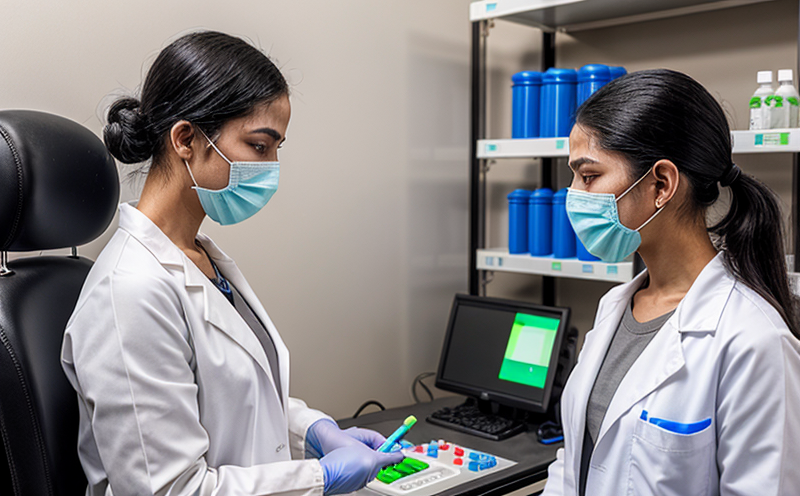Safety Pharmacology Tumor Biomarker Expression Testing
When developing pharmaceuticals, ensuring that new drugs are safe and effective is paramount. One critical aspect of this process involves testing for potential genotoxicity, carcinogenicity, and mutagenicity—all of which can lead to adverse health effects if not properly addressed during the development phase.
In this context, Safety Pharmacology Tumor Biomarker Expression Testing plays a crucial role in assessing the safety profile of pharmaceutical compounds. This testing focuses on identifying any potential for tumor formation or exacerbation due to the presence of specific biomarkers within cells. By examining these biomarkers, researchers can better understand how drugs might interact with cellular pathways and influence tumorigenesis.
The primary goal of this service is to provide comprehensive evaluation through advanced analytical techniques capable of detecting even subtle changes in gene expression patterns associated with cancer development. This approach ensures that compounds entering clinical trials are as safe as possible, thereby minimizing risks to patients while still allowing for innovation and progress in medical treatments.
The testing involves multiple steps starting from sample collection until final reporting. Samples must be prepared carefully according to strict protocols designed specifically for tumor biomarker analysis. Once collected, they undergo various stages including extraction of DNA/RNA/proteins followed by quantification using real-time PCR or Western blotting methods depending on the target protein(s).
After preparation, the samples are analyzed for specific markers known to be involved in carcinogenesis such as p53, Bcl-2 family members, and others relevant to the particular compound under investigation. Advanced imaging technologies like immunohistochemistry (IHC) or flow cytometry may also play a part depending on what kind of information needs to be gathered.
The results generated from these analyses are then compiled into detailed reports that summarize findings along with interpretations regarding potential risks posed by the tested substance. These insights help guide further research and development efforts ensuring compliance with regulatory requirements set forth by organizations like FDA, EMA, etc., as well as adherence to industry best practices.
It is important to note that such tests are not just limited to cancer drugs; they can also be applied across different therapeutic areas where there’s a need for understanding the impact of novel agents on cell biology. For instance, in cardiovascular medicine, it might help determine if certain compounds could induce smooth muscle proliferation leading to adverse events like restenosis after angioplasty.
Given the complexity involved in conducting these types of assays accurately and reproducibly, selecting an experienced partner with state-of-the-art facilities becomes essential. Our laboratory adheres strictly to international standards such as ISO/IEC 17025:2017 ensuring high-quality results every time.
- Comprehensive analysis of gene expression changes related to tumor formation.
- Identification and quantification of key biomarkers involved in carcinogenesis.
- Use of advanced technologies like real-time PCR, Western blotting, IHC, and flow cytometry.
- Detailed reporting including interpretation of findings for regulatory submission purposes.
Quality and Reliability Assurance
We understand the importance of delivering reliable and accurate test results. That’s why we have implemented rigorous quality control measures throughout our testing process. From sample preparation to final analysis, each stage is meticulously monitored to ensure precision and consistency.
Our laboratory personnel undergo continuous training to stay updated on the latest methodologies and technologies relevant to genotoxicity, carcinogenicity, and mutagenicity studies. This commitment ensures that we maintain strict adherence to international standards such as ISO/IEC 17025:2017.
Regular audits conducted by independent bodies further reinforce our dedication to maintaining top-notch quality assurance practices. By doing so, we provide peace of mind knowing that all tests performed are accurate and trustworthy.
We pride ourselves on providing not only reliable data but also actionable insights derived from thorough evaluation processes. Our team works closely with clients during project initiation stages to understand their specific needs before designing customized testing protocols tailored specifically towards those goals. This collaborative approach ensures that no detail is overlooked, resulting in meaningful recommendations that can significantly impact product development timelines and strategies.
International Acceptance and Recognition
The acceptance of our services extends beyond national borders, being recognized globally for their quality and reliability. Our certifications from reputable bodies like ISO/IEC 17025:2017 serve as testament to the high standards we uphold in every aspect of our operations.
Our testing methods comply with international guidelines set forth by organizations such as FDA, EMA, and WHO, ensuring that all data generated is consistent with global regulatory expectations. This broad acceptance facilitates smoother collaboration between international partners involved in drug development projects.
The recognition we receive from these authoritative bodies adds value to our clients' products, enhancing credibility in the marketplace. It also helps expedite approval processes when submitting applications for marketing authorization or other regulatory approvals.





